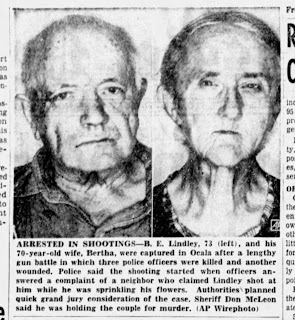Edward S. Lindley, and his wife
Bertha, (70), were from the Kokomo, Indiana area where Mr. Lindley had been a
math teacher, and school principal from 1921 to 1930. He suffered a stroke,
causing his retirement, and in 1932 started drawing disability from the Metropolitan
Insurance Company. In March of 1933 Lindley had a nervous breakdown, and was
arrested for firing a weapon at one of his neighbors. He was sent to Central
State Hospital for 10 months, and after his release, he and his wife moved near
Ft. Lauderdale, Florida on some land they had bought in 1910.
At the beginning of World War 2, the
Lindley’s moved to Moss Bluff in Marion county, and lived there for about ten
years. While there, Edward Lindley believed his neighbors were spies for
Metropolitan Insurance sent to disprove his disability claim. Feeling persecuted, he and his wife moved to
a small house in Ocala.
Next door to their home was a couple
from Long Island, NY. Mr. Lindley
believed they were also spies, and when they moved, he thought they had trained
his new neighbor, Douglas Wingfield to spy on him too. After some items went missing, Wingfield put
a “keep out” sign in his yard, and may have gotten into a verbal dispute with
Mrs. Lindley.
On the day of the shooting, Mr.
Lindley claimed that he shot into the air to get Wingfield’s attention since he
was hard of hearing. Wingfield said the
bullet came within a foot of his head, and he ran to a neighbor’s house, and
called the police.
About 5:30 pm Deputies Bob Hooten,
(56), and Curtis Youngblood, (39), pulled into the Lindley driveway. A witness James B. Williams was a witness to
what happened next. Mrs. Lindley,
carrying a shotgun came out of the house and walked down the driveway to the officers
and met them about 50 feet from the house. She told them to put their guns down
and there would be no shooting. Deputy Wooten grabbed the shotgun away from
her. The witness heard someone yell, “Hey!”, and later Mr. Lindley stated that
he shouted at the officers about four times.
Lindley was standing outside on the west side of the house, and shot
Deputy Youngblood first killing him instantly. Wooten was then shot, and fell
on top of the shotgun he had taken from Mrs. Lindley.
Mrs. Lindley, calmly walked back to
the house, then came back out to retrieve the shotgun from under Wooten’s body.
William’s wife Gwen called the police to report the shooting.
At 5:46 pm, Sheriff Don McLeod, and
Deputy W.G. Ergle, Jr. arrived and
McLeod shouted, for the Lindleys to “Come on out!” This was answered by a
barrage of shots fired from the house. Assistant Ocala police Chief Mahlon O.
Tuck had arrived with other officers, and was standing about 60 yards from the house providing cover for State
Patrolman Sam Oswald as he crept up to a window on the west side of the house
to toss in a tear gas canister. Tuck was hit and killed at that time. Deputy Ergle was hit and wounded as he tried
to get to Youngblood’s body. The firing continued for about an hour until the
tear gas finally forced the Lindley’s to surrender. There were 30 officers involved during the siege and they fired over 1,000 rounds into the little cinder block house.
Four witnesses reported that they
saw Mrs. Lindley in the backyard with a gun during the shooting. She tried to
escape at the rear of the yard, but ran back inside when McLeod yelled at her. Mrs
Lindley waved a white handkerchief and came out, followed a few minutes later
by her husband.
The Lindley’s were arrested and charged
with three counts of murder, and one of assault with intent to commit murder.
On July 25th a hearing adjudged Mr. Lindley to be insane and he was
to be committed to the State Hospital at Chattahoochee. He appeared to be
confused as he was led away for his trip to the hospital. The next day Mrs. Lindley was released on her
own recognizance and returned to Indiana to live with her daughter. The authorities did not believe they had
enough to convict her without her husband to stand trial with her. She promised to return if there ever was a
trial. Before she left, the Lindley’s
bank account of $17,191 was given to the widows of the fallen officers. In 1956, the guns Edward Lindley owned were
auctioned and $499 was raised. This was also given to the widow. The State Legislature voted a payment of $225
per month to the widows for 13 and a half years.
Edward Lindley lived until December
10, 1971 never leaving the Hospital in Chattahoochee. Bertha lived to be 96
years old, dying on June 16, 1980. She
lived with her daughter in Greentown, Indiana.




No comments:
Post a Comment